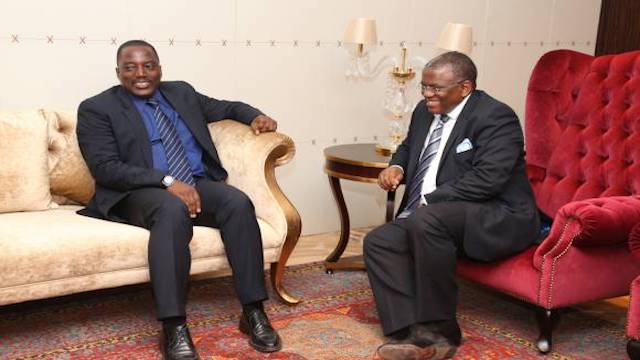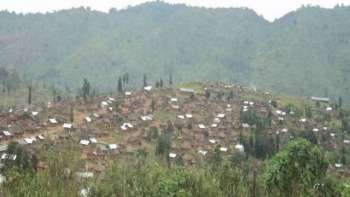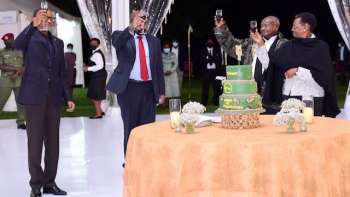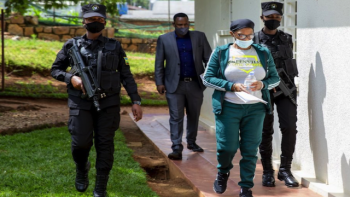On December 23, 2016, Angola government announced the highly significant decision to immediately withdraw their troops from the Democratic Republic of the Congo, to "keep neutrality", during the on-going political crisis and the ensuing violence. The decision was long forthcoming, according to AfroAmerican Network sources in Kinshasa.
A Long Awaited Decision.
On Sept 26, 2016, Angola's government withdrew its ambassador to the Democratic Republic in Congo and its diplomatic mission in DRC’s capital Kinshasa and sent them to Brazzaville, across the river. The official reason was that it was a security measure following violent protests calling for the country’s President Joseph Kabila’s departure from power. In fact, rumors of the attacks on the Angola's
mission had circulated. Angola’s Minister of Foreign Affairs, George Rebelo Chikoti, after meeting with DRC’s Information Minister Raymond Tshibanda in New York had, at the time, denied the rumors.
“These direct attack issues to our facilities are not true, we do not have those elements. The ambassador withdrew some staff, families to the Republic of Congo, where he was until the day before yesterday. But I think the situation is returning to normal, “said George Chikoti, Angola’s Minister of Foreign Affairs The Minister had also denied information circulating that Angola had withdrawn its troops to the neighbouring country.
What followed then was telling. According to AfroAmerica Network sources in Kinshasa, immediately after Angola's decision to withdraw the diplomatic mission, DRC President Joseph Kabila felt that it was a matter of days before Angola withdraw its troops from DRC. He appeared to have millions reasons to worry.
Angolan troops had been deployed in DRC to support Laurent Desire Kabila's regime during its war against Rwanda and Uganda, in late 1990's, in what was known as African World War I. Laurent Desire Kabila was eventually assassinated by an alleged Rwandan operative, working as one of his bodyguards. He was replaced by his son, Joseph Kabila, the current president. Angola then became Joseph Kabila's main military and diplomatic support, with Angola's troops apparently remaining the backbone of Joseph Kabila's Republican Guard.
Hence, since early 2016, when Joseph Kabila had started to show his intentions to remain in power, Western governments had contacted Minister George Rebelo Chicoti and asked him to use Angola's government influence to pressure on President Kabila in favor of handing over power peacefully. Minister George Rebelo Chicoti, one of the most influential UNITA leaders, has maintained his ties with the West, especially France where he studied and Canada where he worked, while also serving a UNITA liaison, when UNITA was still supported by the West. He eventually joined Jose Eduardo dos Santos' MPLA government, following the Bicesse agreements. According to source, he quickly became a trusted advisor to Angola's president.
With a mounting Angola's pressure on President Kabila in favor of a peaceful outcome to the crisis and the withdraw of the diplomatic mission to Brazzaville,
Joseph Kabila's Appeal to Rwandan General James Kabarebe
Joseph Kabila turned to the East: he urgently dispatched an emissary to General James Kabarebe, the Rwandan Defence Minister, in Kigali, Rwanda and asked him to convince General Paul Kagame to send him a battalion of well trained Rwandan troops to integrate his Republican Guard and take over from Angolan troops he no longer trusted. He insisted that the Rwandan selected special forces troops should be able to easily blend in with FADRDC troops. General Kabarebe, the Rwandan Defense Minister, got the approval of General Kagame to select and send 350 young men, mostly from the Hutu ethnic group.
When Angola's military leaders recently found out about the Rwandan troops already integrated in the Republican Guard, a decision was quickly made to withdraw their troops without delay, officially to keep Angola government's neutrality during the on-going political crisis and the ensuing violence.
Targeted Assassinations in Plan?
According to sources close to Congolese key opposition leaders, after announcing the decision to withdraw their troops, Angola's officials made calls to one of the leading Congolese opposition leaders and asked him to warn others of potential risks on the lives of opposition leaders, including Moise Katumbi, a former Joseph Kabila's ally turned a staunch opponent. The sources told Afroamerica Network that Angola's officials made a call to Vital Kamerhe to specifically warn him of lurking dangers on his life.
Joseph Kabila has expressed to Angola's officials his displeasure with the change of heart by the once close ally Vital Kamerhe. Vital Kamerhe, who was expected to be nominated the Prime Minister until he was outsmarted by Joseph Kabila at the last minute, has apparently decided to score his own points. In the latest rounds of political negotiations led by the CENCO, Vital Kamerhe has actively sided with Etienne Tshisekedi's and Moise Katumbi's Rassemblement against the Presidential Majority (MP).
According to the sources, Joseph Kabila was also incensed with the last trip by Moise Katumbi in USA in late November 2016, where the latter apparently met and secured the support from the President-elect Donald Trump. While in USA, On November 29, 2016, Moise Katumbi called on Joseph Kabila to step down:
“On the 19th, we don’t need to have more blood. We need a peaceful transition of power,” Katumbi said, speaking in Washington, D.C. at the Atlantic Council, before adding that: “The [DRC] government has not taken a single step, physical or administrative, to prepare for the elections as required by the constitution. On the contrary, the current regime has become more corrupt, intolerant, repressive and violent.”
















